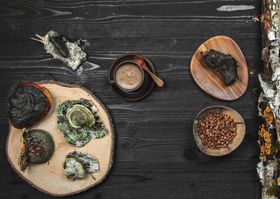4 Natural Remedies for Inflammation: Mushrooms, CBD, and More
Inflammation is at the root of so many medical conditions. Treatment of inflammation is complex and frequently requires a many pronged approach. Conventional medicine has some treatments for inflammation but often the advice is to try to prevent inflammation in the first place. Prevention is partly down to diet and lifestyle but may be helped by using natural remedies including mushrooms.
Updated April 14, 2023.

Inflammation is the body's effort to protect you from outside invaders and infection. It is a part of the immune response but is so effective at killing invading pathogens that it can also harm the body's own cells, often being the cause of pain and other medical conditions.
Acute inflammation occurs when there is a sudden injury or a temporary infection or virus. Chronic inflammation lasts longer than 12 weeks and occurs with ongoing disease and, in particular, autoimmune diseases.
Attacking chronic inflammation is particularly difficult and demands a variety of methods, from preventive diet and lifestyle changes through to conventional medicine and then on to natural remedies. Keep reading to discover the best options available to you.
What Is Inflammation?
Inflammation is the process whereby the immune system (in particular white blood cells) attacks invaders like viruses, bacteria, and anything that is considered a threat to the body. Inflammation can also occur in autoimmune disorders, where the body misidentifies its own cells as invaders.
A variety of diseases have also been linked to chronic inflammation, including all forms of cancer, heart disease, and asthma.
Though inflammation is usually fought with pharmaceutical drugs, there are also many natural at-home remedies that can produce positive results.
1. Mushrooms
A variety of functional mushrooms seem to have anti-inflammatory properties and antioxidant effects, according to research (1). Their numerous active compounds—including polysaccharides, proteoglycans, and terpenoids—are instrumental in preventing inflammation and then reducing build-up.
Mushrooms are often eaten as part of meals, which is a great way to experience the benefit of these adaptogens over time. They can also be powdered and added to drinks or taken as supplements. The best mushrooms for this purpose include:
- Chaga Has antioxidant as well as anti-inflammatory qualities.
- Reishi Best for inhibiting inflammation.
- Cordyceps Best for inhibiting and treating inflammation.
- Lion's Mane Known for being anti-inflammatory and easy to ingest.
» Learn more: Our M2CBD formula
2. CBD
CBD is known for having anti-inflammatory properties that may inhibit inflammatory cytokines (1). CBD interacts with the endocannabinoid system in ways that may decrease inflammation, and have an extremely low level of risk.
CBD can be taken in many forms, including as an oil or tincture, a topical preparation, vaping, a supplement, and as an edible. Edibles have a delayed effect and are long-acting so can be a useful way to get a sustained effect, though oils and tinctures taken sublingually are widely regarded as the most bioavailable and effective method. Vaping is not recommended as it can damage the lungs and airways.
» Looking for great CBD- and functional mushroom-infused products? Browse our store
3. Herbs
Anti-inflammatory herbs are readily available and can be easily incorporated into your diet. They are generally safe in the right doses, and the best ones for fighting inflammation include:
- GingerGinger contains anti-oxidant and anti-inflammatory properties and works in the way COX-2 inhibitors do to manage inflammation (3).
- TumericTumeric's main anti-inflammatory component is curcumin (4).
- GarlicGarlic's main anti-inflammatory components come from its sulfur compounds which have been shown to decrease inflammation (5).
- CardamomResearch suggests it reduces inflammatory markers and has anti-oxidant properties as well (6).
4. Lifestyle Choices
Inflammation is negatively impacted by a variety of lifestyle factors and choices. Prevention and control of inflammation can be helped by examining these factors and actively choosing to make better choices:
- Smoking causes inflammation by activating neutrophils.
- Heavy alcohol use adds to systemic inflammation by interfering with the natural gut biome.
- Prolonged stress causes and aggravates inflammation by provoking the release of cortisol.
- Sleep deprivation can contribute to systemic inflammation.
Quitting smoking, moderating alcohol, and minimising stress can all lead to decreased systemic inflammation. Moderate exercise may also suppress inflammation, as well as getting adequate sleep (six to eight hours per night) and improving the quality of your sleep.
» Struggling with stress and poor sleep? Try our Beauty Sleep Drops and Relax Drops
Combine Remedies for Maximum Effect
Natural remedies can help to prevent and manage inflammation, but a combination of remedies and lifestyle changes may provide the best results. Luckily, many of these remedies can easily be incorporated into daily life without too much effort.
The effectiveness of natural remedies will depend in part upon the cause of the inflammation and the extent of the inflammation. It is essential to consult a doctor to diagnose the exact causes of inflammation instead of attempting to self-diagnose, especially when considering whether or not you should add extra supplements and treatments into your life.







